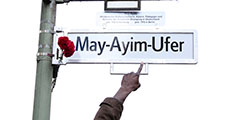For more than one hundred years this street honoured a ‘pioneer’ of colonial times. Today it honours instead the Afro-German activist, artist and scholar May Ayim, who campaigned against racism.
This street in the borough of Kreuzberg was renamed May-Ayim-Ufer on 27 February 2010, with the unveiling of a commemorative plaque dedicated to the Afro-German poet and educator May Ayim (1960-1996). May Ayim was an anti-racist, feminist activist whose academic work and lyric poetry condemned colonial ideas and commonplace racism. She was a founding member of the Initiative Schwarze Menschen in Deutschland-ISD (Initiative of Black Persons in Germany).
From 1895 to 2010, this street was called Groebenufer, after Otto Friedrich von der Groeben, the founder of the first colony from Brandenburg in the area that is now Ghana. The Groß-Friedrichsburg fort was a stronghold in the 17th century for trade of goods and the deportation of slaves to the Caribbean.
Changing street names is part of a postcolonial commemorative culture against racism
A pressure group made up of various organisations and individuals has been campaigning since 2007 to have streets and squares in Berlin which bear colonial names renamed. In a reversal of this policy, from now on these places are to honour people whose actions contributed to critical discourse on German colonial crimes and helped to change the racist structure. May-Ayim-Ufer is the first street where this reversal of perspective was made possible.
Particularly active in the street renaming campaign are the ISD, the organisation ‘Berlin Postkolonial’ and the ‘Berliner Entwicklungspolitischer Ratschlag’. Their aim is to foster postcolonial awareness and anti-racist teaching in Germany.
Even now, there are still many streets and squares bearing the names of people and events from colonial times, and even today in general discourse German colonial crimes are often overlooked or played down.
However, the debate over the renaming of streets also shows that there is now a greater number of people in favour of introducing more a challenging discourse and countering today’s commonplace racism in a critical manner.
Food for thought: Which traces of colonialism do you observe today in the country you live in?
How is racism and segregation rooted in the colonial past?
How can you contribute to change?






 15 minutes by metro
15 minutes by metro